牛津深圳版英语八年级上册Unit 5 Educational exchanges 测试卷测试卷课件(共53张PPT)
文档属性
| 名称 | 牛津深圳版英语八年级上册Unit 5 Educational exchanges 测试卷测试卷课件(共53张PPT) | 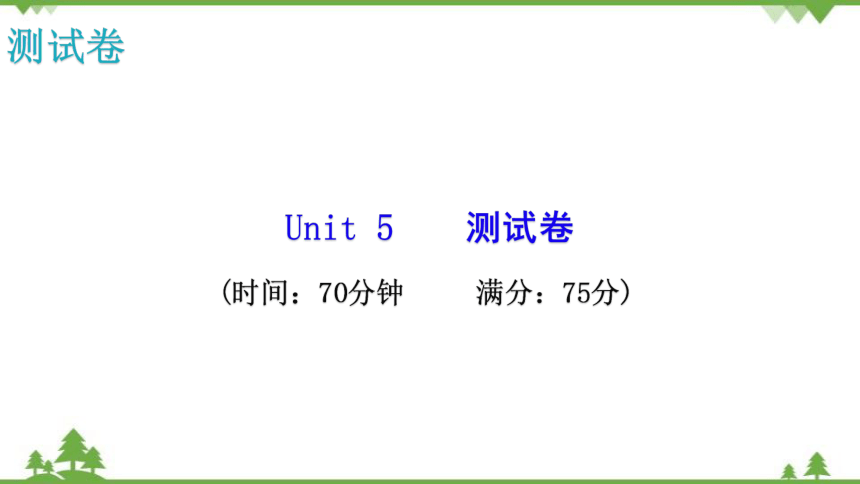 | |
| 格式 | pptx | ||
| 文件大小 | 179.0KB | ||
| 资源类型 | 教案 | ||
| 版本资源 | 牛津深圳版 | ||
| 科目 | 英语 | ||
| 更新时间 | 2022-07-16 16:18:54 | ||
图片预览

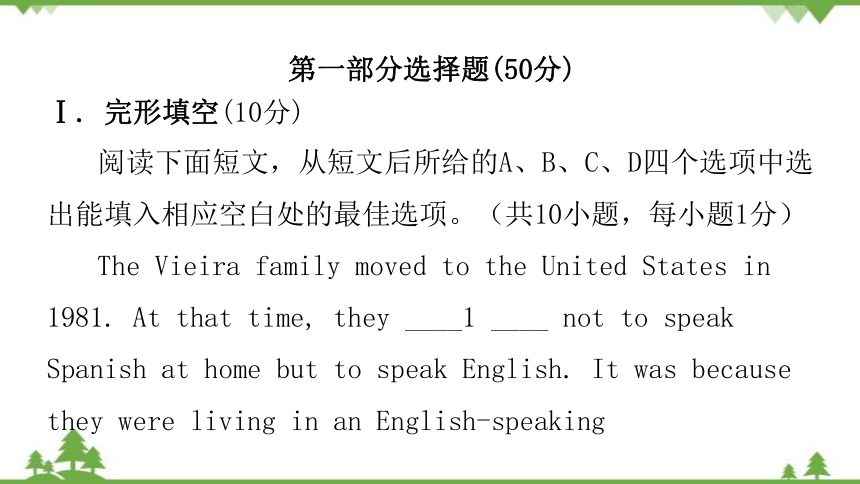
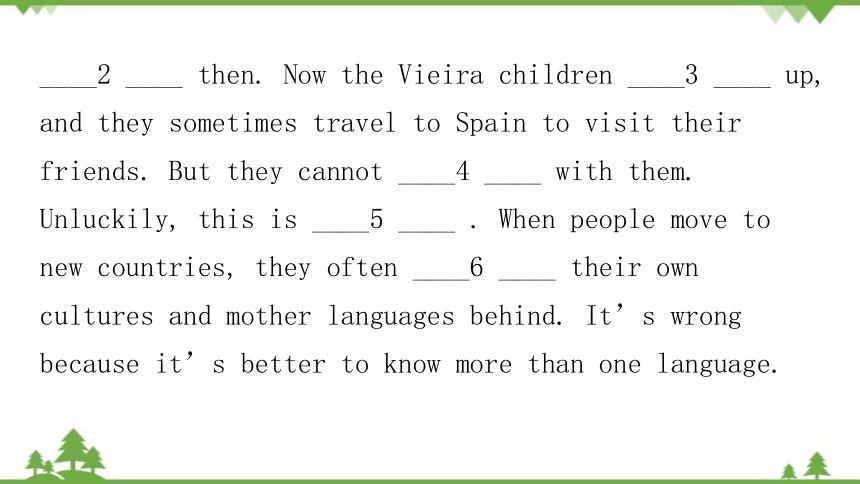
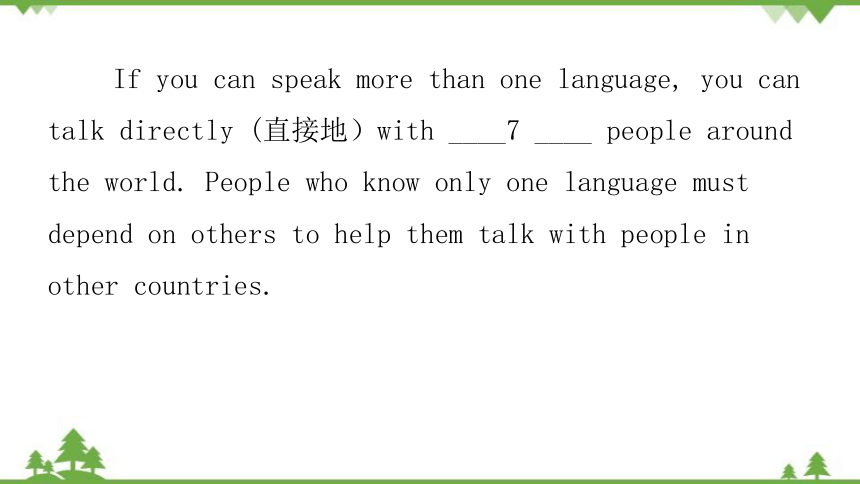
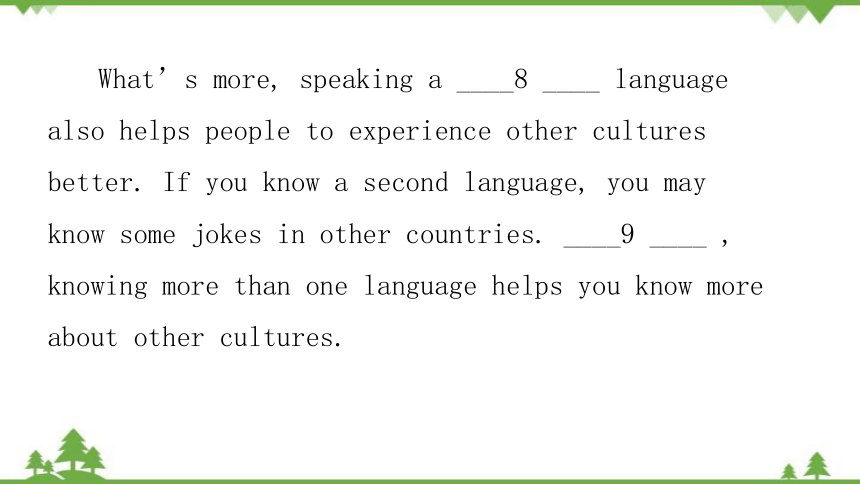
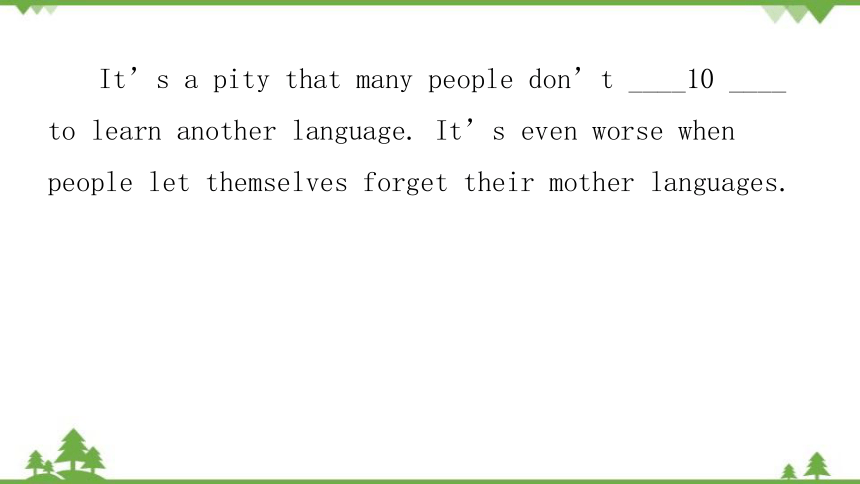
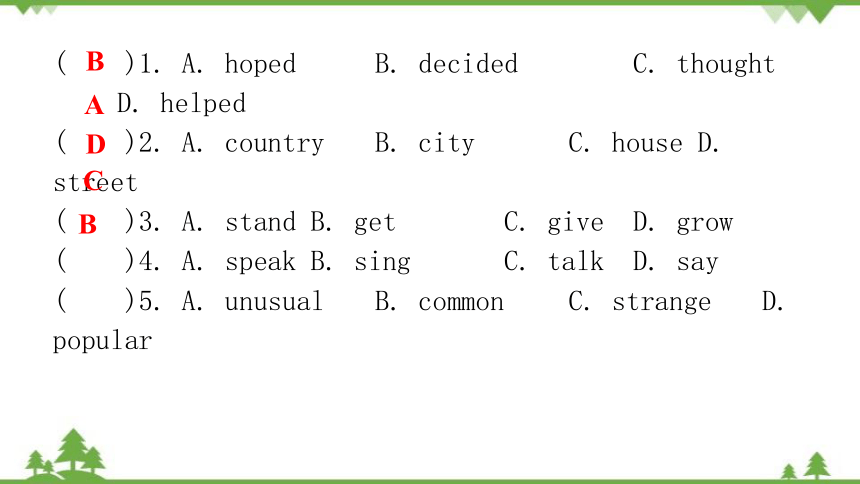
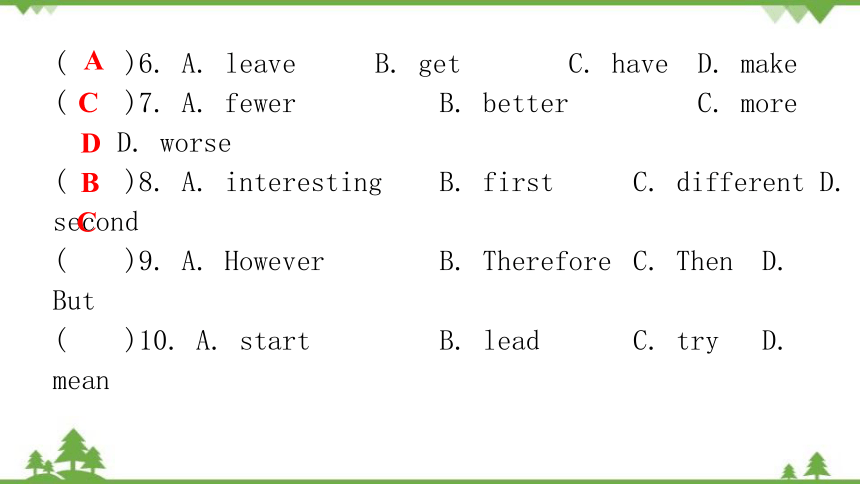
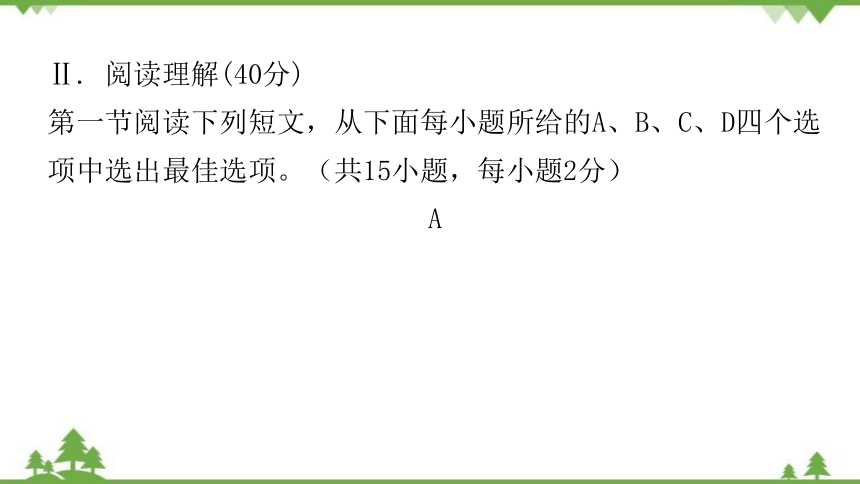
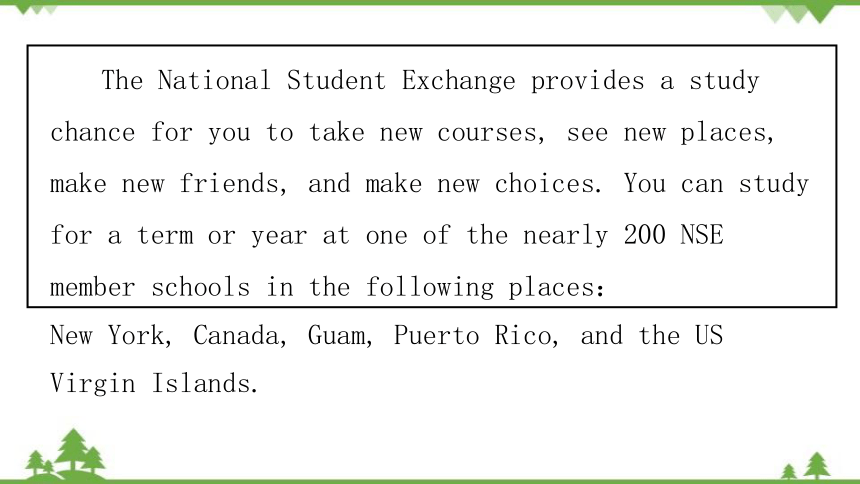

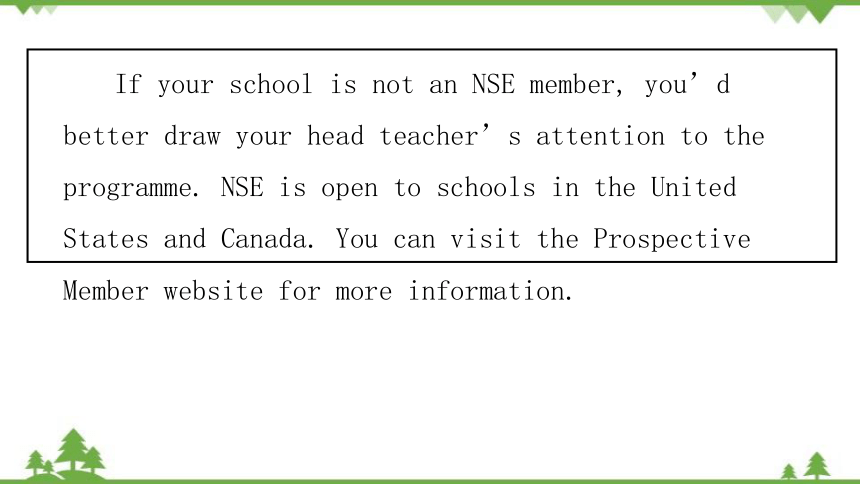
文档简介
(共53张PPT)
Unit 5 测试卷
测试卷
(时间:70分钟 满分:75分)
第一部分选择题(50分)
Ⅰ. 完形填空(10分)
阅读下面短文,从短文后所给的A、B、C、D四个选项中选出能填入相应空白处的最佳选项。(共10小题,每小题1分)
The Vieira family moved to the United States in 1981. At that time, they ____1 ____ not to speak Spanish at home but to speak English. It was because they were living in an English-speaking
____2 ____ then. Now the Vieira children ____3 ____ up, and they sometimes travel to Spain to visit their friends. But they cannot ____4 ____ with them. Unluckily, this is ____5 ____ . When people move to new countries, they often ____6 ____ their own cultures and mother languages behind. It’s wrong because it’s better to know more than one language.
If you can speak more than one language, you can talk directly (直接地)with ____7 ____ people around the world. People who know only one language must depend on others to help them talk with people in other countries.
What’s more, speaking a ____8 ____ language also helps people to experience other cultures better. If you know a second language, you may know some jokes in other countries. ____9 ____ , knowing more than one language helps you know more about other cultures.
It’s a pity that many people don’t ____10 ____ to learn another language. It’s even worse when people let themselves forget their mother languages.
( )1. A. hoped B. decided C. thought D. helped
( )2. A. country B. city C. house D. street
( )3. A. stand B. get C. give D. grow
( )4. A. speak B. sing C. talk D. say
( )5. A. unusual B. common C. strange D. popular
B
C
D
A
B
( )6. A. leave B. get C. have D. make
( )7. A. fewer B. better C. more D. worse
( )8. A. interesting B. first C. different D. second
( )9. A. However B. Therefore C. Then D. But
( )10. A. start B. lead C. try D. mean
B
C
D
A
C
Ⅱ. 阅读理解(40分)
第一节阅读下列短文,从下面每小题所给的A、B、C、D四个选项中选出最佳选项。(共15小题,每小题2分)
A
The National Student Exchange provides a study chance for you to take new courses, see new places, make new friends, and make new choices. You can study for a term or year at one of the nearly 200 NSE member schools in the following places:
New York, Canada, Guam, Puerto Rico, and the US Virgin Islands.
The programme is open to students that enrolled (登记)at one of the NSE member schools. You can take part in NSE to:
*broaden(开阔) your mind *find new ways of study
*learn from different teachers *learn to live by yourself
*experience personal growth *experience life in a different culture
If your school is not an NSE member, you’d better draw your head teacher’s attention to the programme. NSE is open to schools in the United States and Canada. You can visit the Prospective Member website for more information.
( )11. How many places can you study in
A. Three. B. Four. C. Five. D. Six.
( )12. What can you NOT get from NSE
Learn from different teachers.
B. Work and live in the host country in the future.
C. Learn to live by yourself.
D. Experience life in a different culture.
C
B
( )13. What should your school do if it isn’t an NSE member
Visit the Prospective Member website.
B. Call NSE to ask for information.
C. Visit the member schools.
D. Get information by email.
A
( )14. What’s the purpose (目的)of the passage
A. To ask students to draw their head teachers’ attention.
B. To tell us how to join NSE.
C. To introduce some host countries.
D. To call on students to study as exchange students.
D
( )15. Where may you read this passage
From the Internet.
B. From a storybook.
C. From a science magazine.
D. From a map.
A
B
Living in a foreign culture can be exciting,but it can also be confusing (令人迷惑的).A group of American who taught English in other countries recently discussed their experiences.They found that miscommunication was always possible,even over something as simple as “yes” and “no”.
On her first day in Micronesia, an island in the Pacific Ocean,Lisa thought people weren’t paying any attention to her.The day was hot.She went into a store and asked,“Do you have cold drinks ”The woman there didn’t say anything.Lisa repeated the question.Still the woman said nothing.She later learned that the woman had answered her—She had raised her eyebrows (眉毛),which in Micronesia means “yes”.
Jane remembered an experience she had in Bulgaria,a country in Europe.She went to a restaurant that was known for its cabbage.She asked the waiter, “Do you have cabbage today?”He nodded his head.Jane waited,but the cabbage never came. In that country, a nod means no.
Tom had a similar problem when he arrived in India.After explaining something in class,he asked his students if they understood.They answered with many different nods and shakes of the head.He thought some people had not understood,so he explained again.When he asked again,they did the same thing—He soon found out that his students did understand.In India,people nod and shake their heads in different ways, which
depends on where they come from.You have to know where a person is from to understand whether they mean “yes” or “no”.
( )16. What did these Americans teaching English in other countries find
A.They should go abroad for vacations.
B.They needed to learn foreign languages.
C.They should often discuss their experiences.
D.They had problems with communications.
( )17. How do people in Micronesia show “yes”
A.They nod heads. B.They raise eyebrows.
C.They shake heads. D.They say “no”.
D
B
( )18. Why did Tom misunderstand his class at first
A.He did not know much about Indian culture.
B.He didn’t explain everything clearly enough.
C.Some students didn’t understand his questions.
D.He didn’t know where the students came from.
A
( )19. Which of the following is TRUE according to this passage?
A.In Bulgaria,nodding heads means no.
B.Jane taught English on an island.
C.Lisa was trying to buy some cabbage.
D.In India,only one way means “yes”.
A
( )20. What is the passage mainly about
A.Body language in foreign restaurants.
B.Class discussion in Indian schools.
C.Miscommunication in different cultures.
D.English teaching in other countries.
C
C
Every year, thousands of students decide to study in another country for a month, a term, or a year. Studying in another country can be an exciting experience.
Why do it
Living in another country can help you learn the language and culture. You will see the world in a new way, and learn more about yourself. The experience of studying in another country is also good for your future resume (履历). Many companies today prefer people who speak a second language, or have an experience living or working in another country.
Making the right choice
Once you decide to study abroad, you have to make choices. To choose the right country or school, ask yourself, “Where do I want to go How much can I pay How long do I want to study abroad Do I want to live with roommates or live alone somewhere else ”
Once you are there
After the first few weeks in another country, many students may feel homesick. They miss their family and friends. And they also miss the way they used to do things. Remember that it takes time to get used to a new place, school and culture. When you feel sad or miss your family and friends, try to talk to others, or write about your feelings in a notebook.
( )21. What does the writer think of studying abroad
A. Exciting. B. Challenging. C. Tiring. D. Boring.
( )22. Which of the following is NOT true about studying in another country
It can help you learn about yourself.
B. It is good for you to learn another language.
C. It is good for your future resume.
D. It can help you work in another country.
A
D
( )23. How many questions do you have to ask yourself if you want to make the right choice
A. Two. B. Three. C. Four. D. Five.
( )24. What is the last paragraph mainly about
A. What homesickness is. B. What to do with homesickness.
C. Why you feel homesick. D. When you feel homesick.
B
C
( )25. Who is the passage mainly written for
Parents.
B. Teachers.
C. Students.
D. Host families.
C
第二节请阅读短文,并从下列方框里的六个句子中选择五个还原到原文中,使原文的意思完整、连贯。(共5小题,每小题1分)
In Thailand, people do not eat with chopsticks like in China, Japan and Korea. They use spoons and forks. 26.______ People will cut most food before meals. If you need to cut food during meals, use the side of your spoon first and then use your fork.
C
27.______ People in Thailand use spoons more often than forks. If you are left-handed, keep the spoon in your left hand and the fork in your right hand.
E
People in Thailand like eating rice. They don’t put rice together with the other food on the same plate. Each person eats rice on his own plate. It’s not necessary to finish all your rice or all your food. 28.______ If you eat up all the food on your plate, it means you want more.
B
29.______ Because the host will ask you two or three times if you want more. It’s the same with drinks. During the meal, never empty your cup or glass. When it’s less than half full,your host or neighbour will fill it again. 30.______ It’s polite to fill the glasses for your neighbours. That means you must keep an eye on your neighbours’ glasses during the meal.
D
A
A. Don’t need to worry if your food on the plate is not enough.
B. It is good to leave a little on your plate.
C. They never use knives.
D. Never fill your own glass.
E. The spoon is more important than the fork.
F. People use chopsticks and spoons in Thailand.
第三节信息匹配
下面的材料A~F分别介绍了六本书。请根据Bob, Lily, Grace, Rachel和Jessica五位同学的需求,帮助他们选择合适的书籍,并将其标号填入题前括号内。 (共5小题,每小题1分)
A. I Am a Pencil: Sam Swope takes a job teaching writing to third-graders at a school in New York. He faces many difficulties because the students speak different languages and have different beliefs(信仰).
B. Our Brother’s Keeper: Jedwin Smith’s brother, Jeff Smith, was killed in Vietnam. After meeting several of Jeff’s old friends in the Marines(海军陆战队), Jedwin decides to make a journey to Vietnam.
C. What It Takes to Pull Me Through: David L.Marcus introduces us to a special school for troubled teenagers. These teenagers are under great stress and it changes their nature(天性).
D. The Most Enjoyable Drives in America: This book by Robert J.Dolezal includes about 400 photographs of wonderful places in America. You can also find maps and the latest information about the state parks.
E. All About Weather: Kids will learn all about four seasons, as well as how clouds form, why it rains, what causes a rainbow, etc. Read it with your children and find the answers!
F. A Party to Remember: Bronco received an invitation to a party, but he can’t find the puzzle piece. During his search, he meets a lot of friends with problems. It is a sweet story especially for kids under 5.
( )31. Bob will go to America for college next year. At weekends, he wants to see some photos of America and know more of the country.
( )32. Lily’s daughter is curious about seasons. She wants to find a book explaining seasons to her little girl.
( )33. Grace is a new teacher. She needs to read something about how to teach writing.
D
E
A
( )34. Rachel teaches a group of junior high school students. Some of her students meet trouble in life. She wants to find a book sharing similar experience.
( )35. Jessica is doing a research about Vietnam. She wants to find some stories about that country.
C
B
第二部分非选择题(25分)
Ⅲ. 语法填空(每小题1分,共10分)阅读下面短文,按照句子结构的语法性和上下文连贯的要求,在空白处填入一个适当的单词或用所给单词的适当形式填空。
Jim started painting when he was three years old. 36. ______ he was five, he was already very good at it. He painted many beautiful and interesting 37. ______ (picture), and people paid a lot of money for them. They said, “This boy is 38. ______ (go) to be famous when he grows up, and then we’re going to sell these
When
pictures
going
pictures for 39. ______ lot more money.”
Jim’s pictures were40. ____________ (difference) from other people’s works because he never painted on the whole paper. He only painted 41. ______ half of it, and the other half was empty.
a
different
on
“That’s very smart,” everyone said. “No one else 42. ______ (do) that like him! There must be something special on his pictures.” One day, someone bought one of 43. ______ (Jim) pictures and then asked him, “Please tell 44. ______ (I), Jim, why do you paint on the bottom of the paper, but not on the top half ”
does
me
Jim’s
“Because I’m short,” Jim said, “and my brushes don’t reach very 45. ______ (highly). That’s why I only paint on the bottom half of the paper.”
high
Ⅳ. 书面表达(15分)
暑假期间,你到澳大利亚进行了交流学习。请根据下面的内容要点,写一篇短文,介绍此次教育交流的情况。
要点:1. 从广州出发,飞行13个小时到达悉尼;
2. 第一个星期,在当地一所学校学习,英语水平有了很大的提高;
3. 第二个星期,参观澳大利亚的名胜,拍了许多特色动物的照片;
4. 谈谈此次交流学习的感想。
提示词:有意义的meaningful 悉尼Sydney
要求:1. 80词左右;
2. 文中不得出现真实姓名和校名;
3. 可适当增加细节,以使条理清楚、行文连贯;
4. 标点正确,书面整洁。
________________________________________________________________________________________________________________
During the summer holiday, I went to Australia as an exchange student. I had a meaningful time there.
________________________________________________________________________________________________________________________________________________________________________________________________________________________________________________________________________________________
I set off from Guangzhou by air and arrived in Sydney 13 hours later. In the first week, I studied in a local school with local students. My English improved a lot. During the second week, I went to visit some places of interest in Sydney and took some photos of special animals.
________________________________________________________________________________________________________________________________________________________________________
I really had a good time in Sydney. I think this experience is very wonderful. If I have another chance, I will study as an exchange student again.
Unit 5 测试卷
测试卷
(时间:70分钟 满分:75分)
第一部分选择题(50分)
Ⅰ. 完形填空(10分)
阅读下面短文,从短文后所给的A、B、C、D四个选项中选出能填入相应空白处的最佳选项。(共10小题,每小题1分)
The Vieira family moved to the United States in 1981. At that time, they ____1 ____ not to speak Spanish at home but to speak English. It was because they were living in an English-speaking
____2 ____ then. Now the Vieira children ____3 ____ up, and they sometimes travel to Spain to visit their friends. But they cannot ____4 ____ with them. Unluckily, this is ____5 ____ . When people move to new countries, they often ____6 ____ their own cultures and mother languages behind. It’s wrong because it’s better to know more than one language.
If you can speak more than one language, you can talk directly (直接地)with ____7 ____ people around the world. People who know only one language must depend on others to help them talk with people in other countries.
What’s more, speaking a ____8 ____ language also helps people to experience other cultures better. If you know a second language, you may know some jokes in other countries. ____9 ____ , knowing more than one language helps you know more about other cultures.
It’s a pity that many people don’t ____10 ____ to learn another language. It’s even worse when people let themselves forget their mother languages.
( )1. A. hoped B. decided C. thought D. helped
( )2. A. country B. city C. house D. street
( )3. A. stand B. get C. give D. grow
( )4. A. speak B. sing C. talk D. say
( )5. A. unusual B. common C. strange D. popular
B
C
D
A
B
( )6. A. leave B. get C. have D. make
( )7. A. fewer B. better C. more D. worse
( )8. A. interesting B. first C. different D. second
( )9. A. However B. Therefore C. Then D. But
( )10. A. start B. lead C. try D. mean
B
C
D
A
C
Ⅱ. 阅读理解(40分)
第一节阅读下列短文,从下面每小题所给的A、B、C、D四个选项中选出最佳选项。(共15小题,每小题2分)
A
The National Student Exchange provides a study chance for you to take new courses, see new places, make new friends, and make new choices. You can study for a term or year at one of the nearly 200 NSE member schools in the following places:
New York, Canada, Guam, Puerto Rico, and the US Virgin Islands.
The programme is open to students that enrolled (登记)at one of the NSE member schools. You can take part in NSE to:
*broaden(开阔) your mind *find new ways of study
*learn from different teachers *learn to live by yourself
*experience personal growth *experience life in a different culture
If your school is not an NSE member, you’d better draw your head teacher’s attention to the programme. NSE is open to schools in the United States and Canada. You can visit the Prospective Member website for more information.
( )11. How many places can you study in
A. Three. B. Four. C. Five. D. Six.
( )12. What can you NOT get from NSE
Learn from different teachers.
B. Work and live in the host country in the future.
C. Learn to live by yourself.
D. Experience life in a different culture.
C
B
( )13. What should your school do if it isn’t an NSE member
Visit the Prospective Member website.
B. Call NSE to ask for information.
C. Visit the member schools.
D. Get information by email.
A
( )14. What’s the purpose (目的)of the passage
A. To ask students to draw their head teachers’ attention.
B. To tell us how to join NSE.
C. To introduce some host countries.
D. To call on students to study as exchange students.
D
( )15. Where may you read this passage
From the Internet.
B. From a storybook.
C. From a science magazine.
D. From a map.
A
B
Living in a foreign culture can be exciting,but it can also be confusing (令人迷惑的).A group of American who taught English in other countries recently discussed their experiences.They found that miscommunication was always possible,even over something as simple as “yes” and “no”.
On her first day in Micronesia, an island in the Pacific Ocean,Lisa thought people weren’t paying any attention to her.The day was hot.She went into a store and asked,“Do you have cold drinks ”The woman there didn’t say anything.Lisa repeated the question.Still the woman said nothing.She later learned that the woman had answered her—She had raised her eyebrows (眉毛),which in Micronesia means “yes”.
Jane remembered an experience she had in Bulgaria,a country in Europe.She went to a restaurant that was known for its cabbage.She asked the waiter, “Do you have cabbage today?”He nodded his head.Jane waited,but the cabbage never came. In that country, a nod means no.
Tom had a similar problem when he arrived in India.After explaining something in class,he asked his students if they understood.They answered with many different nods and shakes of the head.He thought some people had not understood,so he explained again.When he asked again,they did the same thing—He soon found out that his students did understand.In India,people nod and shake their heads in different ways, which
depends on where they come from.You have to know where a person is from to understand whether they mean “yes” or “no”.
( )16. What did these Americans teaching English in other countries find
A.They should go abroad for vacations.
B.They needed to learn foreign languages.
C.They should often discuss their experiences.
D.They had problems with communications.
( )17. How do people in Micronesia show “yes”
A.They nod heads. B.They raise eyebrows.
C.They shake heads. D.They say “no”.
D
B
( )18. Why did Tom misunderstand his class at first
A.He did not know much about Indian culture.
B.He didn’t explain everything clearly enough.
C.Some students didn’t understand his questions.
D.He didn’t know where the students came from.
A
( )19. Which of the following is TRUE according to this passage?
A.In Bulgaria,nodding heads means no.
B.Jane taught English on an island.
C.Lisa was trying to buy some cabbage.
D.In India,only one way means “yes”.
A
( )20. What is the passage mainly about
A.Body language in foreign restaurants.
B.Class discussion in Indian schools.
C.Miscommunication in different cultures.
D.English teaching in other countries.
C
C
Every year, thousands of students decide to study in another country for a month, a term, or a year. Studying in another country can be an exciting experience.
Why do it
Living in another country can help you learn the language and culture. You will see the world in a new way, and learn more about yourself. The experience of studying in another country is also good for your future resume (履历). Many companies today prefer people who speak a second language, or have an experience living or working in another country.
Making the right choice
Once you decide to study abroad, you have to make choices. To choose the right country or school, ask yourself, “Where do I want to go How much can I pay How long do I want to study abroad Do I want to live with roommates or live alone somewhere else ”
Once you are there
After the first few weeks in another country, many students may feel homesick. They miss their family and friends. And they also miss the way they used to do things. Remember that it takes time to get used to a new place, school and culture. When you feel sad or miss your family and friends, try to talk to others, or write about your feelings in a notebook.
( )21. What does the writer think of studying abroad
A. Exciting. B. Challenging. C. Tiring. D. Boring.
( )22. Which of the following is NOT true about studying in another country
It can help you learn about yourself.
B. It is good for you to learn another language.
C. It is good for your future resume.
D. It can help you work in another country.
A
D
( )23. How many questions do you have to ask yourself if you want to make the right choice
A. Two. B. Three. C. Four. D. Five.
( )24. What is the last paragraph mainly about
A. What homesickness is. B. What to do with homesickness.
C. Why you feel homesick. D. When you feel homesick.
B
C
( )25. Who is the passage mainly written for
Parents.
B. Teachers.
C. Students.
D. Host families.
C
第二节请阅读短文,并从下列方框里的六个句子中选择五个还原到原文中,使原文的意思完整、连贯。(共5小题,每小题1分)
In Thailand, people do not eat with chopsticks like in China, Japan and Korea. They use spoons and forks. 26.______ People will cut most food before meals. If you need to cut food during meals, use the side of your spoon first and then use your fork.
C
27.______ People in Thailand use spoons more often than forks. If you are left-handed, keep the spoon in your left hand and the fork in your right hand.
E
People in Thailand like eating rice. They don’t put rice together with the other food on the same plate. Each person eats rice on his own plate. It’s not necessary to finish all your rice or all your food. 28.______ If you eat up all the food on your plate, it means you want more.
B
29.______ Because the host will ask you two or three times if you want more. It’s the same with drinks. During the meal, never empty your cup or glass. When it’s less than half full,your host or neighbour will fill it again. 30.______ It’s polite to fill the glasses for your neighbours. That means you must keep an eye on your neighbours’ glasses during the meal.
D
A
A. Don’t need to worry if your food on the plate is not enough.
B. It is good to leave a little on your plate.
C. They never use knives.
D. Never fill your own glass.
E. The spoon is more important than the fork.
F. People use chopsticks and spoons in Thailand.
第三节信息匹配
下面的材料A~F分别介绍了六本书。请根据Bob, Lily, Grace, Rachel和Jessica五位同学的需求,帮助他们选择合适的书籍,并将其标号填入题前括号内。 (共5小题,每小题1分)
A. I Am a Pencil: Sam Swope takes a job teaching writing to third-graders at a school in New York. He faces many difficulties because the students speak different languages and have different beliefs(信仰).
B. Our Brother’s Keeper: Jedwin Smith’s brother, Jeff Smith, was killed in Vietnam. After meeting several of Jeff’s old friends in the Marines(海军陆战队), Jedwin decides to make a journey to Vietnam.
C. What It Takes to Pull Me Through: David L.Marcus introduces us to a special school for troubled teenagers. These teenagers are under great stress and it changes their nature(天性).
D. The Most Enjoyable Drives in America: This book by Robert J.Dolezal includes about 400 photographs of wonderful places in America. You can also find maps and the latest information about the state parks.
E. All About Weather: Kids will learn all about four seasons, as well as how clouds form, why it rains, what causes a rainbow, etc. Read it with your children and find the answers!
F. A Party to Remember: Bronco received an invitation to a party, but he can’t find the puzzle piece. During his search, he meets a lot of friends with problems. It is a sweet story especially for kids under 5.
( )31. Bob will go to America for college next year. At weekends, he wants to see some photos of America and know more of the country.
( )32. Lily’s daughter is curious about seasons. She wants to find a book explaining seasons to her little girl.
( )33. Grace is a new teacher. She needs to read something about how to teach writing.
D
E
A
( )34. Rachel teaches a group of junior high school students. Some of her students meet trouble in life. She wants to find a book sharing similar experience.
( )35. Jessica is doing a research about Vietnam. She wants to find some stories about that country.
C
B
第二部分非选择题(25分)
Ⅲ. 语法填空(每小题1分,共10分)阅读下面短文,按照句子结构的语法性和上下文连贯的要求,在空白处填入一个适当的单词或用所给单词的适当形式填空。
Jim started painting when he was three years old. 36. ______ he was five, he was already very good at it. He painted many beautiful and interesting 37. ______ (picture), and people paid a lot of money for them. They said, “This boy is 38. ______ (go) to be famous when he grows up, and then we’re going to sell these
When
pictures
going
pictures for 39. ______ lot more money.”
Jim’s pictures were40. ____________ (difference) from other people’s works because he never painted on the whole paper. He only painted 41. ______ half of it, and the other half was empty.
a
different
on
“That’s very smart,” everyone said. “No one else 42. ______ (do) that like him! There must be something special on his pictures.” One day, someone bought one of 43. ______ (Jim) pictures and then asked him, “Please tell 44. ______ (I), Jim, why do you paint on the bottom of the paper, but not on the top half ”
does
me
Jim’s
“Because I’m short,” Jim said, “and my brushes don’t reach very 45. ______ (highly). That’s why I only paint on the bottom half of the paper.”
high
Ⅳ. 书面表达(15分)
暑假期间,你到澳大利亚进行了交流学习。请根据下面的内容要点,写一篇短文,介绍此次教育交流的情况。
要点:1. 从广州出发,飞行13个小时到达悉尼;
2. 第一个星期,在当地一所学校学习,英语水平有了很大的提高;
3. 第二个星期,参观澳大利亚的名胜,拍了许多特色动物的照片;
4. 谈谈此次交流学习的感想。
提示词:有意义的meaningful 悉尼Sydney
要求:1. 80词左右;
2. 文中不得出现真实姓名和校名;
3. 可适当增加细节,以使条理清楚、行文连贯;
4. 标点正确,书面整洁。
________________________________________________________________________________________________________________
During the summer holiday, I went to Australia as an exchange student. I had a meaningful time there.
________________________________________________________________________________________________________________________________________________________________________________________________________________________________________________________________________________________
I set off from Guangzhou by air and arrived in Sydney 13 hours later. In the first week, I studied in a local school with local students. My English improved a lot. During the second week, I went to visit some places of interest in Sydney and took some photos of special animals.
________________________________________________________________________________________________________________________________________________________________________
I really had a good time in Sydney. I think this experience is very wonderful. If I have another chance, I will study as an exchange student again.
